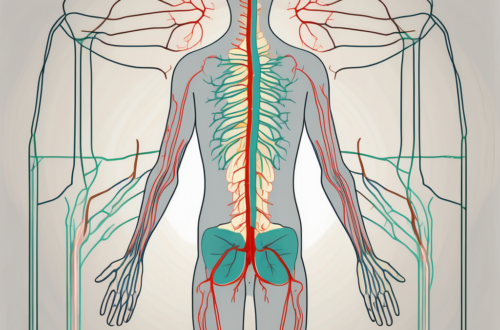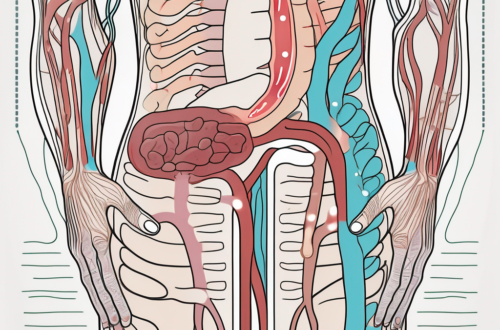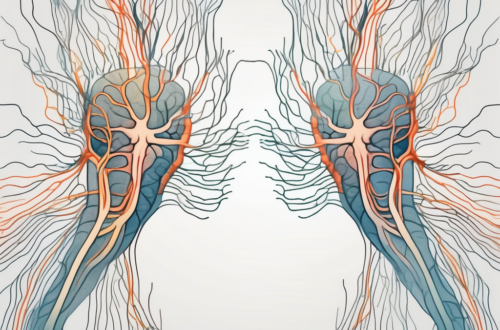The parasympathetic nervous system plays a vital role in our overall well-being and bodily functions. It works in conjunction with the sympathetic nervous system to maintain balance and regulate various bodily processes. However, when there is weakness in the parasympathetic nerve, it can lead to a range of symptoms that can significantly impact an individual’s quality of life.
The Parasympathetic Nervous System: An Overview
In order to understand the symptoms of parasympathetic nerve weakness, it is important to have a basic understanding of the parasympathetic nervous system itself. The parasympathetic nervous system is one of the components of the autonomic nervous system, which controls involuntary bodily functions. It is responsible for the “rest and digest” response, promoting relaxation and efficient digestion.
The parasympathetic nervous system plays a crucial role in maintaining the body’s overall balance and well-being. It works in opposition to the sympathetic nervous system, which is responsible for the “fight or flight” response. While the sympathetic nervous system prepares the body for action and stress, the parasympathetic nervous system helps restore calm and normal functioning.
The Role and Function of the Parasympathetic Nervous System
The parasympathetic nervous system functions to conserve and restore energy by promoting activities such as digestion, urination, and sexual arousal. It helps keep our body’s systems running smoothly by slowing down heart rate, increasing intestinal and glandular activity, and promoting relaxation of the muscles.
When the parasympathetic nervous system is activated, it stimulates the release of acetylcholine, a neurotransmitter that plays a key role in transmitting signals between nerve cells. This neurotransmitter acts on various target organs and tissues, initiating a cascade of physiological responses that promote rest and recovery.
One of the primary functions of the parasympathetic nervous system is to regulate digestion. It stimulates the production of digestive enzymes and increases blood flow to the digestive organs, ensuring efficient nutrient absorption and waste elimination. Additionally, it promotes the release of saliva, which aids in the breakdown of food and initiates the digestive process.
The Anatomy of the Parasympathetic Nervous System
The parasympathetic nervous system consists of two main components: the cranial nerves and the sacral nerves. The cranial nerves, originating from the brainstem, regulate functions in the head, neck, chest, and abdominal regions. These nerves include the vagus nerve, which is the longest cranial nerve and has widespread effects on various organs and tissues.
On the other hand, sacral nerves, located in the lower spinal region, control functions related to the lower abdomen, genitals, and pelvic organs. These nerves play a crucial role in sexual arousal, bladder control, and bowel movements. Dysfunction or damage to the sacral nerves can lead to various symptoms, such as urinary incontinence, erectile dysfunction, and constipation.
Together, these components contribute to the overall regulation of the parasympathetic nervous system. They work in harmony to maintain homeostasis and ensure the body’s vital functions are operating optimally.
Identifying Parasympathetic Nerve Weakness
When the parasympathetic nerve weakens or becomes impaired, it can manifest through various symptoms that can significantly affect an individual’s daily life. The parasympathetic nervous system is responsible for regulating the body’s rest and digest response, controlling functions such as heart rate, digestion, and pupil constriction.
Understanding the signs and symptoms of parasympathetic nerve weakness is crucial in order to seek appropriate medical attention and treatment. While these symptoms can vary from person to person, there are some common signs that may indicate a weakened parasympathetic nerve.
Common Symptoms of Parasympathetic Nerve Weakness
The symptoms of parasympathetic nerve weakness can vary from person to person, but some common signs include:
- Chronic fatigue: Individuals with parasympathetic nerve weakness may experience persistent fatigue, even after getting adequate rest. This can greatly impact their energy levels and overall quality of life.
- Digestive issues such as bloating, constipation, or diarrhea: The parasympathetic nervous system plays a crucial role in regulating digestion. When it weakens, individuals may experience disruptions in their digestive processes, leading to symptoms such as bloating, constipation, or diarrhea.
- Irregular heartbeat or palpitations: The parasympathetic nervous system helps regulate heart rate and rhythm. When it becomes impaired, individuals may experience irregular heartbeats or palpitations, which can be concerning and uncomfortable.
- Blurred vision or increased sensitivity to light: The parasympathetic nervous system controls the constriction of the pupils in response to light. When it weakens, individuals may experience blurred vision or increased sensitivity to light.
- Dizziness or lightheadedness: A weakened parasympathetic nerve can lead to feelings of dizziness or lightheadedness, which can be particularly bothersome during daily activities.
It is important to note that these symptoms can also be indicative of other health conditions, and it is crucial to consult with a healthcare professional for an accurate diagnosis. A thorough medical evaluation, including a detailed medical history and diagnostic tests, may be necessary to identify the underlying cause of these symptoms.
Severity and Duration of Symptoms
The severity and duration of symptoms associated with parasympathetic nerve weakness can vary from person to person. While some individuals may experience mild and intermittent symptoms, others may have more severe and persistent manifestations.
The duration of symptoms can also vary, with some individuals experiencing short-term discomfort, while others may deal with long-term effects. It is important to seek medical attention if you are experiencing any of these symptoms, as a healthcare professional can provide a comprehensive evaluation and develop an appropriate treatment plan tailored to your specific needs.
Living with parasympathetic nerve weakness can be challenging, but with proper medical care and lifestyle modifications, individuals can manage their symptoms and improve their overall well-being.
Causes of Parasympathetic Nerve Weakness
Understanding the causes of parasympathetic nerve weakness is crucial for identifying potential risk factors and implementing appropriate treatment strategies.
The parasympathetic nervous system plays a vital role in maintaining homeostasis in the body. It is responsible for regulating various bodily functions, such as digestion, heart rate, and relaxation. When the parasympathetic nerve weakens, it can lead to a range of symptoms and health issues.
Underlying Health Conditions
Several underlying health conditions can contribute to the weakening of the parasympathetic nerve. Autoimmune disorders, such as multiple sclerosis or Guillain-Barré syndrome, can cause damage to the nerves, including the parasympathetic nerves. Diabetes, a metabolic disorder characterized by high blood sugar levels, can also affect the nerves and lead to parasympathetic nerve weakness. Additionally, neurodegenerative diseases like Parkinson’s disease or Alzheimer’s disease can impact the functioning of the parasympathetic nervous system. In some cases, certain types of cancer, such as pancreatic or lung cancer, can also affect the parasympathetic nerves.
It is essential to consult with a healthcare professional for a thorough evaluation and accurate diagnosis of any underlying health conditions. Proper management and treatment of these conditions can help alleviate symptoms and improve parasympathetic nerve function.
Lifestyle Factors and Parasympathetic Nerve Weakness
In addition to underlying health conditions, lifestyle factors can also contribute to parasympathetic nerve weakness. Chronic stress, a common issue in today’s fast-paced world, can have a detrimental effect on the nervous system. Prolonged periods of stress can lead to an overactive sympathetic nervous system, which can disrupt the balance between the sympathetic and parasympathetic systems. This imbalance can weaken the parasympathetic nerve and hinder its ability to regulate bodily functions effectively.
Poor nutrition can also impact the health of the nervous system, including the parasympathetic nerve. A diet lacking in essential nutrients, such as vitamins and minerals, can impair nerve function and contribute to nerve weakness. On the other hand, adopting a well-balanced diet that includes a variety of fruits, vegetables, whole grains, and lean proteins can provide the necessary nutrients to support optimal nervous system function.
Lack of exercise and sedentary lifestyles can further exacerbate parasympathetic nerve weakness. Regular physical activity helps improve blood circulation, reduces inflammation, and promotes overall nerve health. Engaging in activities like walking, swimming, or yoga can stimulate the parasympathetic nervous system and enhance its functioning.
Inadequate sleep or poor sleep quality can also impact the health of the parasympathetic nerve. During sleep, the body goes through essential restorative processes, including nerve repair and regeneration. Lack of sleep can disrupt these processes and contribute to nerve weakness. Establishing a consistent sleep routine and creating a sleep-friendly environment can help improve sleep quality and support the health of the parasympathetic nerve.
By addressing lifestyle factors and making positive changes, such as managing stress levels, adopting a well-balanced diet, engaging in regular exercise, and prioritizing quality sleep, individuals can support optimal parasympathetic nerve function and overall nervous system health.
Diagnostic Procedures for Parasympathetic Nerve Weakness
Accurate diagnosis is crucial for identifying parasympathetic nerve weakness and implementing an effective treatment plan. Healthcare professionals may utilize several diagnostic procedures to assess the functioning of the parasympathetic nervous system.
Parasympathetic nerve weakness can manifest in various ways, including symptoms such as excessive sweating, digestive issues, and abnormal heart rate. To determine the underlying cause of these symptoms, healthcare professionals employ a combination of medical history, physical examination, and specialized tests.
Medical History and Physical Examination
During a medical history and physical examination, a healthcare professional will gather information about the patient’s symptoms, medical history, and lifestyle factors. This comprehensive evaluation helps in identifying potential triggers or risk factors that may contribute to parasympathetic nerve weakness.
The healthcare professional will inquire about the duration, frequency, and severity of symptoms experienced by the patient. They will also ask about any recent illnesses, injuries, or surgeries that could have an impact on the parasympathetic nervous system. Additionally, lifestyle factors such as stress levels, diet, exercise routine, and medication use will be taken into consideration.
As part of the physical examination, the healthcare professional may perform certain neurological tests to evaluate the functioning of the parasympathetic nervous system. These tests may include assessing pupillary response to light, evaluating heart rate variability, and examining the patient’s ability to control bladder and bowel movements.
Laboratory Tests and Imaging
In some cases, healthcare professionals may order laboratory tests to evaluate specific markers or perform imaging studies such as magnetic resonance imaging (MRI) or computed tomography (CT) scans to get a closer look at the nervous system.
Laboratory tests may involve analyzing blood samples to measure hormone levels, check for autoimmune markers, or assess organ function. These tests can provide valuable insights into the overall health of the patient and help identify any underlying conditions that may be affecting the parasympathetic nervous system.
Imaging studies, such as MRI or CT scans, allow healthcare professionals to visualize the structures of the nervous system in detail. These non-invasive procedures can help identify any abnormalities or lesions that may be affecting the parasympathetic nerves. By obtaining clear images of the brain, spinal cord, and peripheral nerves, healthcare professionals can make more accurate diagnoses and develop targeted treatment plans.
Overall, the diagnostic procedures for parasympathetic nerve weakness involve a comprehensive assessment of the patient’s medical history, physical examination, and specialized tests. Through these procedures, healthcare professionals can gather the necessary information to determine the underlying cause of the nerve weakness and provide appropriate treatment options.
Treatment Options for Parasympathetic Nerve Weakness
When it comes to treating parasympathetic nerve weakness, the approach may vary depending on the underlying cause, severity of symptoms, and individual factors. It is important to consult with a healthcare professional for personalized treatment recommendations.
Parasympathetic nerve weakness can be a challenging condition to manage, but there are various treatment options available to help alleviate symptoms and improve overall well-being. In addition to medications and therapies, lifestyle modifications and home remedies can also play a significant role in supporting the parasympathetic nervous system.
Medications and Therapies
In some cases, medications may be prescribed to alleviate specific symptoms or manage underlying health conditions associated with parasympathetic nerve weakness. These medications can help regulate the functioning of the parasympathetic nervous system and provide relief from symptoms such as excessive sweating, digestive issues, or urinary problems.
Additionally, certain therapies such as physical therapy, occupational therapy, or relaxation techniques may be recommended to enhance nervous system functioning and promote overall well-being. Physical therapy exercises can help strengthen weak muscles and improve coordination, while occupational therapy can assist individuals in adapting to daily activities and managing any limitations caused by parasympathetic nerve weakness.
Relaxation techniques, such as deep breathing exercises, meditation, or yoga, can also be beneficial in reducing stress levels and promoting relaxation of the parasympathetic nervous system. These techniques can help restore balance to the autonomic nervous system, which is responsible for regulating involuntary bodily functions.
Lifestyle Modifications and Home Remedies
Adopting healthy lifestyle habits can play a significant role in supporting the parasympathetic nervous system and managing parasympathetic nerve weakness. It is important to note that lifestyle modifications should be done under the guidance of a healthcare professional to ensure safety and effectiveness.
Ensuring an adequate amount of sleep is essential for the proper functioning of the parasympathetic nervous system. Sleep allows the body to rest and repair, promoting overall well-being. Developing a consistent sleep schedule, creating a relaxing bedtime routine, and creating a comfortable sleep environment can all contribute to better sleep quality.
Managing stress levels is also crucial in supporting the parasympathetic nervous system. Chronic stress can negatively impact the functioning of the autonomic nervous system, including the parasympathetic branch. Techniques such as meditation, yoga, or engaging in hobbies and activities that bring joy and relaxation can help reduce stress levels and promote a sense of well-being.
Incorporating a balanced diet rich in nutrients can provide the body with the necessary fuel to support the parasympathetic nervous system. Foods that are high in antioxidants, such as fruits and vegetables, can help reduce oxidative stress and inflammation in the body. Additionally, consuming foods rich in omega-3 fatty acids, such as fatty fish or flaxseeds, can support optimal nervous system functioning.
Regular exercise is another important aspect of managing parasympathetic nerve weakness. Engaging in physical activity can help improve blood circulation, strengthen muscles, and promote overall well-being. It is important to choose exercises that are suitable for individual abilities and limitations, and to consult with a healthcare professional before starting any exercise program.
While lifestyle modifications and home remedies can be beneficial in supporting the parasympathetic nervous system, it is important to consult with a healthcare professional before making any significant lifestyle changes or relying solely on home remedies. They can provide personalized guidance and ensure that the chosen treatment options are safe and effective.
Prevention Strategies for Parasympathetic Nerve Weakness
While not all causes of parasympathetic nerve weakness are preventable, there are certain strategies individuals can adopt to promote optimal nervous system health and reduce the risk of impairment.
Healthy Lifestyle Habits
Maintaining a healthy lifestyle is essential for overall well-being. This includes prioritizing a balanced diet rich in nutrients, engaging in regular physical activity, managing stress levels, getting adequate sleep, and avoiding harmful substances.
Regular Check-ups and Early Detection
Regular check-ups with a healthcare professional are crucial for early detection of any potential underlying health conditions or early signs of parasympathetic nerve weakness. Early intervention and treatment can help prevent further complications and optimize long-term outcomes.
Living with Parasympathetic Nerve Weakness
Living with parasympathetic nerve weakness can present unique challenges, but there are coping mechanisms and support systems available to help individuals navigate their daily lives.
Coping Mechanisms and Support Systems
Developing effective coping mechanisms, such as stress management techniques and seeking emotional support from friends, family, or support groups, can help individuals better manage their symptoms and improve their overall well-being.
Long-term Prognosis and Quality of Life
The long-term prognosis and quality of life for individuals with parasympathetic nerve weakness can vary depending on several factors, including the underlying cause, severity of symptoms, and overall health. With appropriate management and support, many individuals are able to lead fulfilling lives and minimize the impact of their symptoms.
In conclusion, understanding the symptoms of parasympathetic nerve weakness is crucial for early detection and intervention. By recognizing the signs, individuals can seek appropriate medical attention and implement lifestyle modifications to support their overall well-being. Consulting with a healthcare professional is essential for an accurate diagnosis and personalized treatment recommendations. With proper care and management, individuals can lead fulfilling lives despite the challenges associated with parasympathetic nerve weakness.





